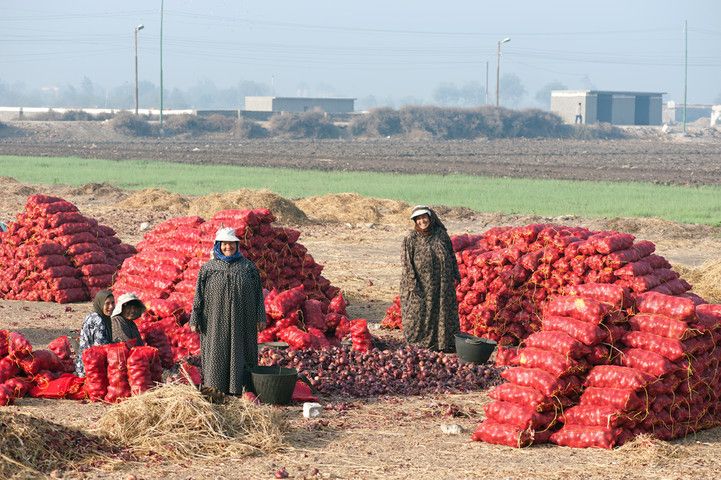By
Stephen Fragaszy, Consultant, IWMI-Egypt
Maha Al-Zubi, Regional Researcher, IWMI-Jordan
Javier Mateo- Sagasta, Senior Researcher and Coordinator – Water Quality, IWMI
Noha Mahmoud, Project Coordinator, IWMI-Egypt
Youssef Brouziyne, IWMI Representative and CGIAR Water Systems Lead, MENA
Vidhisha Samarasekara, Strategic Program Director – Water – Climate Change and Resilience

Photo:: Hamish John Appleby/IWMI
The promotion of gender equality while effecting climate change adaptation is a political and moral imperative. The International Water Management Institute’s (IWMI) applied research for development in the Middle East and North Africa (MENA) region shows that it also can be effective and efficient, especially when undertaken through pro-poor, market based, and nature inspired interventions. IWMI’s work in MENA has longstanding incorporation of these approaches and objectives, and it has been undertaken in accord with the three principles that underpin the Water Action Agenda that resulted from the 2023 UN Water Conference:
-
- Commit to action;
- Sustain and scale up implementation, and;
- Follow-up and review processes.
Applying the principles in the ReWater MENA project
The recently concluded ReWater MENA project contributed to improving women’s access to resources—especially clean water—that support drought resilience and prevent land degradation. The project aimed to address barriers to water reuse and promote safe reuse practices that improve water and food security, food safety, human and soil health, and livelihoods. IWMI accomplished this by:
- analysing the economic, social, environmental, cultural and political challenges that female farmers face in accessing water and other agriculture-related resources;
- identifying successful reuse technologies, as well as business and governance models in the MENA region, and articulating how they can be adapted successfully to new contexts;
- developing training materials and guidance, and providing training. This capacity building targeted actors at the micro- (individuals, small businesses), meso- (associations, utilities, etc.), and macro-levels (national government agencies, international institutions, etc.). It aimed to help stakeholders address the identified barriers and support uptake of successful technologies as well as business and governance models; and
- developing investment-ready water reuse project proposals in Egypt, Jordan, and Lebanon that leverage regionally successful models, incorporate gender equity components, and show positive benefit-cost ratios.
ReWater MENA had a strong commitment to action, and it focused heavily on improving the enabling environment for the implementation and up-scaling of gender-equitable projects that directly align with Sustainable Development Goal 6, clean water and sanitation for all, among others.
Applying learnings and principles in implementation
IWMI and the wider CGIAR – in collaboration with international and regional partners such as the IUCN, AOAD, and UN-ESCWA, and national stakeholders in government, civil society, private sector, and local communities – are building on this momentum and learning.
We are now progressing into active implementation and up-scaling of climate change adaptation through new regional initiatives such as the Fragility to Resilience Regional Integrated Initiative in Central and West Asia and North Africa (F2R-CWANA) and Al Murunah in MENA.
Commonalities in IWMI’s implementation approach
These initiatives differ substantially in scale and focus, but they share key elements related to 1.) participatory design, 2.) use of market mechanisms, 3.) supporting drought resilience and land restoration, and 4.) incorporating gender equality outcomes at their core.
F2R-CWANA is addressing regional gender disparities while responding to climate, nutrition, and agrifood challenges by applying, scaling, and supporting effective, resilience-focused solutions to reduce fragility and conflict. Al Murunah will improve water security and land management by piloting resilient nature-based water solutions (RNBWS – the integrated application of nature-based solutions for water and agricultural water management) and supporting their up-scaling.
As such, F2R-CWANA has been developed through a participatory process, recognizing that the unique challenges and opportunities presented in CWANA will be most effectively addressed with intellectual, technical, human, and social capital that comes with working in partnership with partners, stakeholders, and beneficiaries. The design process had a strong focus on female participation and empowerment to address gender-specific bottlenecks such as limited access to technologies, information, and land rights to achieve desired gender outcomes. Al Murunah has used the EMPOWERS process to support gender-equal community-level planning of RNBWS pilot projects to address, for example, flash flooding and groundwater degradation in Lebanon and soil salinization in Egypt. Nationally, the involvement of “gender champions” will support gender mainstreaming in institutional capacity building, policy, and up-scaling components of the project.
Both projects rely on market value chains to support up-scaling. For F2R-CWANA, this has broad components such as working through seed propagation and distribution systems and with digital tools. For Al Murunah, it will occur through local market system development and focus on specific goods (e.g., medicinal aromatic plants) and services (e.g., erosion mitigation or water quality remediation) associated with the RNBWS interventions. Connecting rural communities – particularly female-led cooperatives and community-based organizations – to resources, knowledge, and networks will support them to adopt innovative, profitable, and sustainable farming and water management practices.
A just transition for climate change adaptation requires profound efforts to address the interlinked challenges of land degradation, water and food security, gender inequality, and equitable development. By supporting women to leverage the potential of nature-based solutions for water and agricultural management with market systems, IWMI supports sustainable land management, enhances resilience, and improves livelihoods for the poor. Ultimately, this approach will contribute to gender equality, poverty reduction, and a just transition by fostering an inclusive, sustainable, and thriving agriculture sector and resilient food systems.

